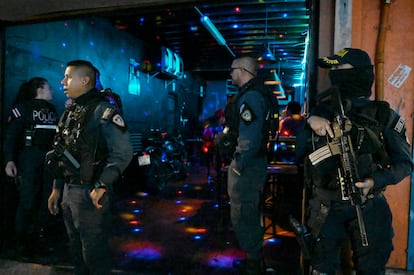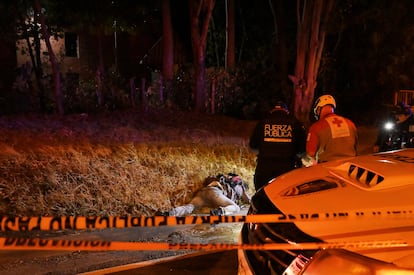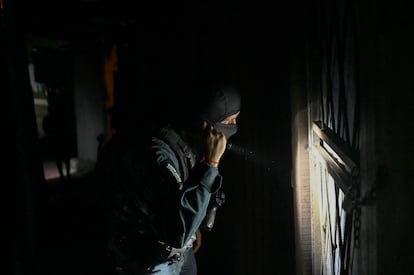Drug violence threatens Costa Rica
The authorities are looking for ways to respond to the crisis after the record number of homicides in 2023. Meanwhile, the country’s industry fears the impact of money laundering

Three students from a school in the Siquirres municipality, in the Limón province of Costa Rica, ended up hospitalized this week after being shot with a 9 millimeter pistol that a hitman used to kill an alleged rival in the drug trafficking business. It was noon on Monday, and there were dozens of mothers and their children coming and going at the school. But the shooter had only one thing on his mind. According to official figures, this crime puts the Central American country within reach of the number of violent deaths it registered in the first 50 days of 2023, which, with 907 murders, was the bloodiest year in Costa Rican history.
The scene was terrifying, educational staff told the press. The children and two adults were taken to the hospital, other students said that they did not want to return to classes, and the school was closed for the rest of the week. The mayor of the municipality criticized the government for not granting the police the resources it had requested, and now everyone regrets what happened, although almost no one is surprised.
Drug trafficking groups and their violent battles have spread throughout the territory of Costa Rica, the nation that for decades boasted of being the safest in the region. A murder is no longer news, a shooting in broad daylight is not unusual either, and an execution in front of a school has happened before. But last Monday there were children injured by gunshots, and this is a tragic novelty for 2024. The disturbing escalation of violent crime is reaching levels that have exceeded the state’s ability to tackle it with the resources and limited police forces it currently has.
According to the authorities, the threat comes from about 340 criminal organizations that have used more than 200 identified hitmen. These organizations move millions of dollars through Costa Rica, which is enough to disrupt local economies and even cause a sharp drop in the exchange rate, which is what different sectors of the economy have begun to suspect.

A month ago Minister of Security Mario Zamora admitted that local criminal organizations associated with foreign gangs have created a force that “exceeds the current police model, the administration of justice, and the law.” As he spoke, there was breaking news that marked “a new stage” in the ongoing violence. An officer had been murdered that morning during a police operation against a drug trafficking group in a tourist town called Herradura, in the province of Puntarenas. The province has the highest growth in homicides so far in 2024. Days later detectives in Herradura released details of an unusual operation being carried out to extract the decomposed remains of four people from a water tank on a private property.
“The violent activities of these types of groups are no longer confined to fighting between gangs, they are also confronting the forces of public order,” lamented Minister Zamora, casting doubt on one of President Rodrigo Chaves’ frequent messages. In order to relativize the security crisis, he has insisted that the risk is not high for good people and that “those who are on bad paths kill each other.” He has even requested that the homicides be referred to as “combatant casualties in the war among drug traffickers.”
Judicial authorities attribute at least two-thirds of the homicides to the fighting between gangs, but the injured schoolchildren in Siquirres, the police officer killed in Herradura, and the 52 people who died in 2023 as collateral victims of murders were not “combatants.” This figure, published on Tuesday by the data verification platform Double Check, was three times the total for 2022.
It is one of numerous news items that once again addressed the implications of the environment of violence this week. Some included experts giving recommendations on how people should act in the event of a shooting. “I’m sharing this press release that may be useful for us. It is sad to see what this country has become,” a retired teacher commented on Tuesday in a WhatsApp group with her neighbors.

The security crisis is not something new. It started in the last five years, broke out in 2022, and hit a new record in 2023, reaching a figure of 907 homicides and a rate of 17.2 per 100,000 inhabitants. But in 2024 it has sparked political discussion on the necessary legal reforms and to what extent drug trafficking has penetrated state institutions or impacts economic indicators that, in turn, affect productivity.
The authorities have reported slight declines in homicides in certain areas for a few weeks, but they know that the “cancer” is still there, as President Chaves usually calls it. In the first two months of this year, there has been an ongoing debate over toughening laws or recovering the diminished social investment. Meanwhile, the president, in his combative style, engages in political discussions with other state institutions, which he accuses of not doing their job or of hindering progress.
Amid friction and growing concern among Costa Ricans about organized crime and its effects, the Legislative Assembly dominated by opposition parties is moving forward with a list of legal reforms. These aim to increase the number of offenses eligible for preventive detention and restrict alternative enforcement measures of sentencing, measures that some specialists consider insufficient. The government has also proposed trying minors in adult courts in cases of contract killings, in addition to allowing nationals suspected of drug trafficking to be extradited. But its plans face constitutional limits and objections from experts.
Other voices call for a firm hand in the style of Nayib Bukele in El Salvador, whom Chaves himself considers a role model in matters of security. But their ideas clash with Costa Rica’s institutional design and tradition of guarantees, as well as the huge differences between fighting criminal gangs and tackling drug trafficking gangs with a lot of money, international support, and tentacles that reach everywhere.
The concern goes beyond the end of the country’s peace-loving image and the danger that increases in tourism and investment will be reversed. Tourist associations and exporters of traditional products, such as coffee and bananas, and the dynamic technology industry, have all raised the alarm due to the strong appreciation of the local currency (the colón) facing a deluge of dollars that have entered the Costa Rican economy in the last two years. The local value of the dollar has fallen 25% in 18 months and has hit producers who receive their income from abroad. In February, a transnational banana company fired 100 workers blaming the unsustainable exchange rate.

While Chaves maintains that the influx of foreign currency is a sign of his government’s economic success, due to the recovery of tourism after the pandemic and the growth of foreign investments and exports, the Central Bank admits that it does not know where 48% of the incoming currencies has come from, since that percentage belongs to a category that does not require its origin to be identified. That is why starting in March there will be a reform in registering these placements, the Central Bank announced after reiterating that there is no evidence of the money coming from criminal activities.
However, suspicions remain in different sectors of the economy and were expressed last week by a member of the National Council for Supervision of the Financial System (Conassif). “There could be other transfers that include illicit transactions that are difficult to detect and that are not estimated, but which could be large. We can’t avoid it because we have the dead to prove it,” said economist Sylvia Saborío in a forum on the monetary situation in Costa Rica, at which government authorities were also present.
Analysts such as Álvaro Ramos, former deputy minister of security, and other critical voices blame the authorities for their permissiveness towards the threat of money laundering through the exchange system or in activities such as construction, illegal gambling, informal loans, and small businesses. There are groups that fear that a “narco-state” will take root in the country that is still classified as an example of democracy and institutional maturity.
Ecuador is often mentioned as a cautionary tale. Chaves responds that his government is fighting drug trafficking like no other, and to do so he intends to install scanners at all border posts. A number of these are already in operation at the main port terminal on the Caribbean coast, which is the departure point for cocaine shipments to Europe. Thus, he says, he is slashing the profits of trafficking groups, after seizures of drugs and suspicious money fell by half in 2022 — the first year of the current administration — and did not recover in 2023.
“Costa Rica is a country that is not prepared to face what is coming, and not because of ineffectiveness, but because it was not something they expected. This meant that the institutions and regulatory frameworks were not prepared for it, unlike countries in the Northern Triangle,” said the director of the independent organization Crime Stoppers in a recent interview in the Delfino.cr media. The allusion was not only to the legal framework but also to cultural circumstances that were forged in the decades in which Costa Rica saw the security emergencies of its Central American neighbors as alien.
Sign up for our weekly newsletter to get more English-language news coverage from EL PAÍS USA Edition
Tu suscripción se está usando en otro dispositivo
¿Quieres añadir otro usuario a tu suscripción?
Si continúas leyendo en este dispositivo, no se podrá leer en el otro.
FlechaTu suscripción se está usando en otro dispositivo y solo puedes acceder a EL PAÍS desde un dispositivo a la vez.
Si quieres compartir tu cuenta, cambia tu suscripción a la modalidad Premium, así podrás añadir otro usuario. Cada uno accederá con su propia cuenta de email, lo que os permitirá personalizar vuestra experiencia en EL PAÍS.
¿Tienes una suscripción de empresa? Accede aquí para contratar más cuentas.
En el caso de no saber quién está usando tu cuenta, te recomendamos cambiar tu contraseña aquí.
Si decides continuar compartiendo tu cuenta, este mensaje se mostrará en tu dispositivo y en el de la otra persona que está usando tu cuenta de forma indefinida, afectando a tu experiencia de lectura. Puedes consultar aquí los términos y condiciones de la suscripción digital.








































